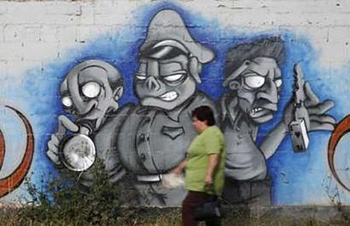 |
 |
 |
 Editorials | Issues | May 2007 Editorials | Issues | May 2007  
The Army, the Police and an Interesting Poll
 Allan Wall - PVNN Allan Wall - PVNN


| | A woman walks past a mural depicting (L-R) a drug addict, a police officer and a car thief in the border city of Tijuana. (Tomas Bravo/Reuters) |
The Mexican Army continues its operations at a high tempo, as President Calderon continues the war against the drug cartels. Is this a good idea? Is the Mexican military the proper tool to use against the cartels? Some critics say no.

One of the critics is Jose Soberanes of the CNDH (National Commission of Human Rights.) And on May 24th, Mexico’s Permanent Congressional Commission also rejected the policy. (The Permanent Congressional Commission is a sort of mini-congress, with 37 members, which operates while the full Congress is not in session.)

The non-binding resolution was introduced in the Commission by the opposition PRD (Party of the Democratic Revolution) and when voted upon, was supported by the PRI (Institutional Revolutionary Party.) Calderon’s PAN (National Action Party) voted against it.

The measure rejects the use of the Mexican military to fight the cartels, on the grounds that that task is properly speaking, police work, and that therefore the Mexican police must be strengthened to be up the task.

Mexico’s news cycle has become a fast one, and just a few hours later, President Calderon, who was out of Mexico City, responded from the north of Mexico, where he was visiting the city of Gomez Palacio, Durango.

Calderon forcefully rejected the resolution, smacking the podium and affirming that, “We will not back down – not one step – in the face of criminal organizations who are threatening our country.”

Also at the podium was Durango governor Ismael Hernandez, who supported Calderon: “It is necessary that we show these criminal organizations a firm hand. And Mr. President, I trust you will not be swayed by this resolution which has the unmistakable signs of partisan politics.”

It’s interesting that Governor Hernandez would refer to partisan politics, as is a member of the PRI and not of Calderon’s PAN. President Calderon has good working relationships with opposition governors. One reason for that is that in Mexico’s centralized political structure, the federal government doles out most of the money to the state governments.

The Mexican Congressional resolution does bring up important issues which should be addressed, such as the proper division of powers between the military and the police.

The resolution called on the strengthening of Mexican police, and specifically their capacity for investigation, prevention and protection be improved.

Local Mexican police forces have many problems – corruption, low salaries, poor equipment. In In the northern Mexican cities of Monterrey and Torreon, police have recently gone on strike to protest their situation.

The training and equipping of local police forces could stand great improvement. But the issue of police corruption must be dealt with as well, as policemen are on the take from cartels, and must be rooted out, starting at the top with corrupt police commanders.

Meanwhile, a recent poll focused on the Mexican security issue had some interesting results. The poll was taken on May 8th, 2007. The same poll was taken 10 months earlier, in July of 2006, when Fox was still in office.

In 2006, 70% of respondents said that public security was bad or very bad, but in May of 2007, only 47% thought it was bad or very bad. This is despite the fact that the rate of cartel killings has increased since July of 2006.

In July of 2006, 54% of the poll-takers thought drug trafficking was increasing, 21% thought it was the same, and 20% thought it had decreased. In May of 2007, 37% thought it had increased, 36% thought it was the same, and 22% thought it was less.

How do you explain these differences? There is more violence than 10 months ago, but the poll respondents give more positive responses. Maybe it’s because Calderon is still a new president, and his leadership and resolve have encouraged Mexicans to feel more secure, despite the fact that there are more killings.

Another contrast noted in the poll is that between the personal safety of Mexicans and the general state of security in Mexican society. In May of 2007, though 67% of Mexicans polled thought national security was at risk, 54% did not not feel personally threatened.

In other words, as bad as the violence is, it hasn’t affected the majority of Mexicans, who continue with daily life as usual.
 Allan Wall is an American citizen who has been teaching English in Mexico since 1991, and writing articles about various aspects of Mexico and Mexican society for the past decade. Some of these articles are about Mexico's political scene, history and culture, tourism, and Mexican emigration as viewed from south of the border, which you can read on his website at AllanWall.net. Allan Wall is an American citizen who has been teaching English in Mexico since 1991, and writing articles about various aspects of Mexico and Mexican society for the past decade. Some of these articles are about Mexico's political scene, history and culture, tourism, and Mexican emigration as viewed from south of the border, which you can read on his website at AllanWall.net.

Click HERE for more articles by Allan Wall. | 
 | |
 |



